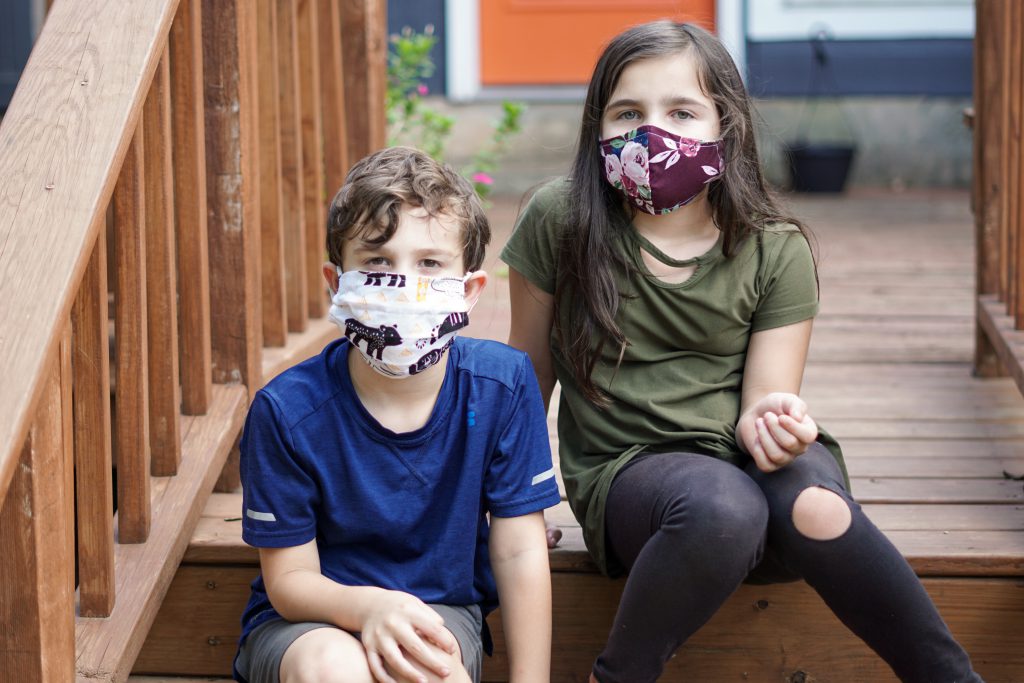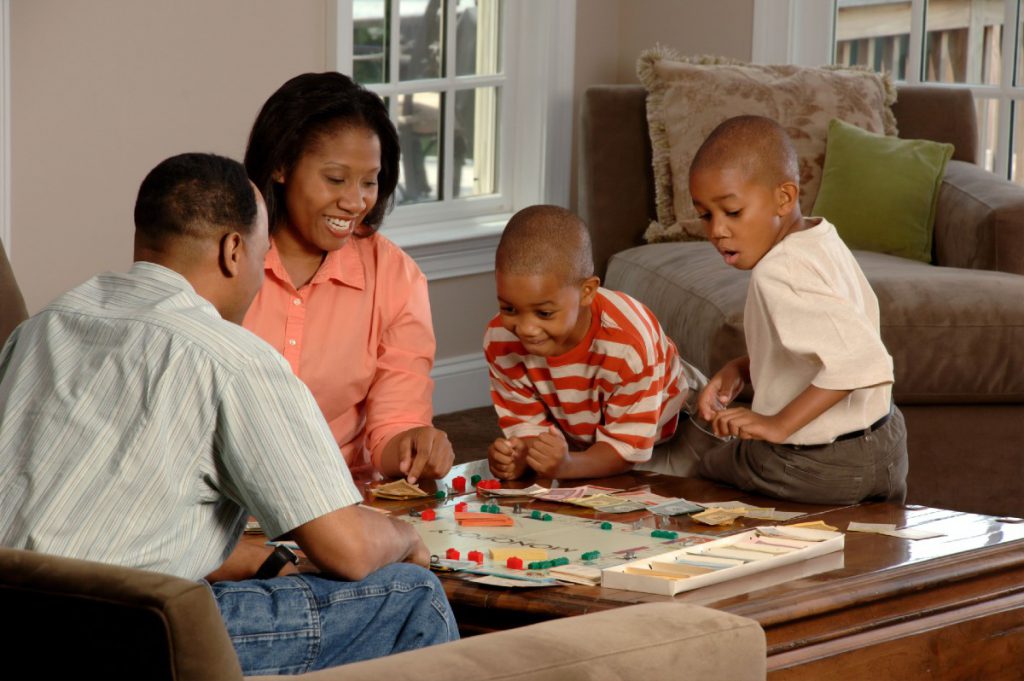By Alyssa Meuwissen, PhD, Research Associate

As the pandemic has dragged on over nearly a year now, I’ve had to adjust my expectations for a return to “normal,” along with everyone else. There’s now a light at the end of the tunnel as vaccines are distributed. Nevertheless, many parents of young children have lingering concerns. The years from birth to five are recognized as a foundational period for child development. Children in that age bracket will have spent 20% of that important period in this altered pandemic life. How will it affect their long-term development?
Normal behavior or pandemic problem?
In my personal experience, it has been hard to sort out normal behavior from the pandemic’s influence. When my younger daughter, now six months old, was six weeks old, my husband contracted COVID-19. Because he was instructed to self-isolate within our home, the only adult face our daughter saw for three weeks was my own. When our baby was 12 weeks old, her grandmothers began providing child care for her and our older daughter. Our baby was very fussy and often cried when she looked at her grandmothers closely. How much of that was typical stranger anxiety and how much was due to her experience in the pandemic?
We didn’t go to any playgrounds for a few months. After playgrounds reopened, another child approached my two-year-old daughter and said, “Hi.” My daughter cried. How much of that was her naturally shy personality and how much was due to the pandemic?
For a few months, my two-year-old was obsessed with Daniel Tiger. Most of her pretend play revolved around things she saw him do: fly a kite, buy shoes, make an obstacle course. She even started using words from the show, like “grr-ific” and “tiger-tastic,” in conversation. Was this simply a two-year-old’s enthusiasm? Or was it because it had been so long since she’d gone to a library, a grocery store, or a restaurant—much less seen friends in person—that she no longer had vivid personal recollections on which to base her pretend play?
In each of these cases, there were likely normal developmental forces at work interacting with the experience of living in a pandemic. There’s no way to know “what might have been” had there been no pandemic. But as parents, we naturally worry about what our children have lost and grieve for this year of their childhood as we had pictured it for them.

As a parent and child psychology researcher, I think it’s important to address parents’ concerns. But I also know it’s important not to get too stressed out about things that won’t matter in the long run. I’ve identified some of the biggest concerns I’ve heard from parents regarding the pandemic’s effect on children. Based on my personal experience and my training as a developmental psychologist, I’ve sorted these concerns into three categories.
- The first category includes pandemic-related circumstances towards which developmental science suggests children will show resilience. I’ve addressed these questions below and provided some tips for parents and caregivers.
- The second category includes legitimate concerns, but ones that we as parents and caregivers can affect positively in the near term. I’ve addressed these in the second post in this series and provided some additional tips.
- The third category includes major causes for concern. In the final post in this series, I’ve explained why addressing these serious problems will require collective effort, rather than individual actions.
Experience-expectant and experience-dependent processes
The framework that has helped me create these categories is a developmental concept that describes how genes and environment interact to result in learning. In a 1987 paper, William Greenough and colleagues suggested that humans learn through what they called experience-expectant and experience-dependent processes.
Experience-expectant processes are based on information that the brain expects to be present in the environment and that we are genetically prepared to take in. This includes sources of information that are universally present in typical development, such as vision or language. If babies are not exposed to these sources of information during a specific time in their development, their brain will prune away the neurons that would typically be devoted to processing them. Experience-dependent processes, on the other hand, are what allow humans to learn a huge variety of skills. Our brains are not “hard-wired” to learn hockey or chess; we can learn these skills at any time in our lives. This kind of learning involves forming new synapses rather than pruning neurons.
Experience-dependent learning: Don’t worry, our kids will catch up
In this section, I’ll address two of the most common concerns I’ve heard from parents.
Will the lack of peer interaction harm my children?
My short answer: There’s no “critical period” for learning social skills. If a child misses out on some things at age two, she can learn them next year at three. While the transition back to frequent, large-group peer interactions might be uncomfortable and require adult support, kids will bounce back. I don’t predict many long-term effects on personality or on children’s ability to make friends.
What can we do to mitigate parents’ concerns?
- Focus on interactions with the people in your household. While your child may not get to interact with as many same-age peers as they normally would, they can learn a lot of skills interacting with siblings and parents. Talk about and model skills like taking turns and using “please” and “thank you.”
- Try short Zoom playdates with planned activities. It’s harder for toddlers and preschoolers to carry on a conversation when they can’t physically interact, but they can have a dance party, do a show and tell of their toys, or play games like “Simon Says.”
- Silver lining: This situation is making siblings (if your child has them) more essential playmates than they otherwise would have been!

Are children suffering from a lack of stimulation?
My short answer: While trips and activities are certainly enjoyable and enriching, all the experiences needed for supporting brain development in young children can be done at home. As a parent, I completely understand that it’s daunting (and repetitive) to be stuck inside all winter with your kids. But as long as children are given the opportunity to play, they are doing the necessary work of childhood.
What can we do to mitigate parents’ concerns?
- If staying at home gets boring, try thinking about different categories of play: pretend play, gross motor, fine motor, music and dancing, construction play, and playing games. Try to promote a mix of these each day.
- Remember that your perspective is different from your child’s. To them, reading the same book over and over again is a great opportunity to learn and understand. In their playroom, they may visit the farm, the fire station, and the moon all within 10 minutes!
- Acknowledge your own sadness about what might have been, but try to reframe another day at home as another day to engage in high-quality play.
Children have grown up in an infinite number of different conditions across history, location, and culture. As a middle-class parent in the United States, I have an “ideal childhood” in mind for my children, but I also know that I am part of a generation whose expectations tend toward intensive parenting and over-involvement. Sometimes, I think about the things that my children are missing out on, like playgrounds, museums, birthday parties, and holiday celebrations. I feel sad about the loss of fun experiences and about the delay in forming positive relationships and discovering my family’s traditions. However, I don’t worry about their long-term development. In many other environments, it’s very normal for children to spend their early childhood at home with one or a few caregivers.
In the next post in this series, I’ll tackle parents’ questions that fall into a kind of “middle ground”: research confirms that they are real concerns, but they also have real solutions.

